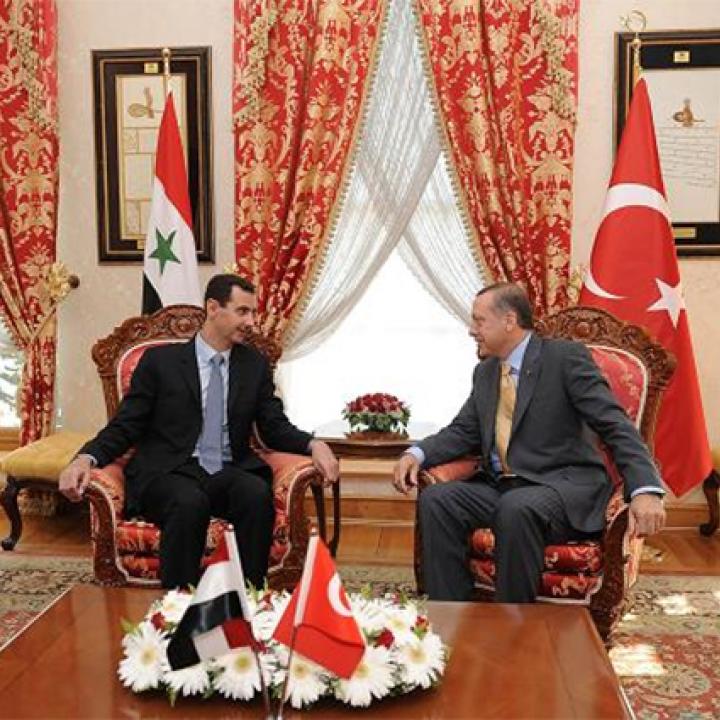

Turkey is divided on what course to pursue in Syria, and the AKP's ability to sell a more muscular policy is by no means guaranteed.
Following this week's suicide bombing in the Turkish city of Gaziantep, Turkey's government has hinted at Syrian complicity in the attacks, with Foreign Minister Ahmet Davutoglu noting, for example, parallels between the bombing and the Syrian regime's tactics.
Such a mindset brings Turkey a step closer to taking action against Damascus. Yet despite such comments, the country is far from united around a policy for taking down Bashar al-Assad's regime anytime soon. These domestic differences have some interesting echoes from almost a decade ago, when Turkey was torn over involvement in another conflict -- the Iraq war.
In 2003, Turkey's recently elected Justice and Development Party (AKP) government supported U.S. efforts in the Iraq war despite significant domestic opposition. In doing so, the Islamist-rooted organization was apparently keen to enamor itself with Washington, thereby gaining leverage against the then powerful Turkish military.
Given how polarized the Turkish political landscape is between the AKP and its secularist opponents, the party's support for U.S. foreign policy resulted in an interesting twist: secularist Turks and their pro-Western military opposed the war in Iraq, while the Islamist-rooted AKP supported it.
Almost a decade later, Turkish politics are still polarized -- in last year's elections, the country was split down the middle, with almost exactly half of voters opting for the ruling party. Ankara's position over al-Assad's regime has led to a 2003-like scenario all over again: the AKP stands with Washington on Syria, while its domestic opponents take issue with the idea of Ankara confronting al-Assad.
For over a year, the main opposition, the secular Republican People's Party, has refused to support the AKP's Syria policy, although the leftist party has edged a little closer to the government's position, proposing an international conference to tackle the crisis.
Meanwhile, having been defanged by the AKP over the past decade, the Turkish military now shies away from clearly voicing opposition to the government's policies, though in private the military is known to be urging the government to ease up over Syria lest Turkey risk being left to confront Syria -- without U.S. backing.
But nationalist Turks, including those under the AKP's big right-wing tent as well as those in the opposition Nationalist Action Party (MHP), have started to more openly criticize Ankara's Syria policy. Such concerns are no doubt exacerbated by recent media reports that Turkey not only hosts the Syrian opposition, including the Syrian National Council (SNC), but might also be providing arms to the rebels.
Opponents of this policy believe that Ankara's policies could usher in a dramatic collapse of the al-Assad regime that could be taken advantage of by Syrian Kurdish groups pushing for an independent Kurdish state. Such groups also fear that the Kurdistan Workers Party (PKK), a group that has waged a violent campaign against Turkey for decades, could take advantage of the post-al-Assad vacuum to establish itself firmly inside Syria.
But even some core AKP members seem to disagree with policies that could precipitate al-Assad's downfall. Take, for instance, the small group of pro-Tehran AKP politicians who are known to have sympathies for Iran. This group certainly doesn't relish the prospect of Ankara becoming embroiled in a proxy war against Iran in Syria, with Tehran standing behind the al-Assad regime and Turkey supporting the opposition.
Back in 2003, the AKP's plans to offer the U.S. assistance in Iraq were thwarted when a vote in the Turkish parliament to authorize the war failed on a technicality -- the required quorum wasn't present, despite the AKP mustering a majority of the votes (although opinion polls showed significant public opposition to the war). Fast forward almost a decade and Turkey is divided again -- and the government's chances of pushing forward a more muscular policy are by no means guaranteed.
Soner Cagaptay is director of the Turkish Research Program at The Washington Institute.
CNN Global Public Square

